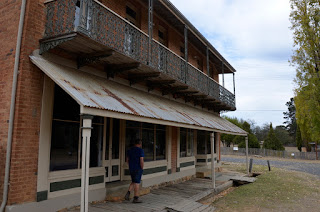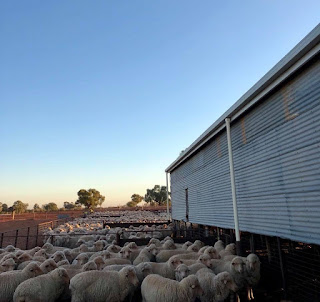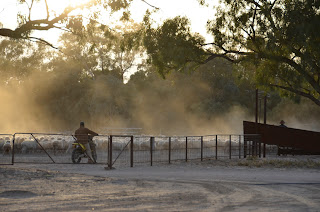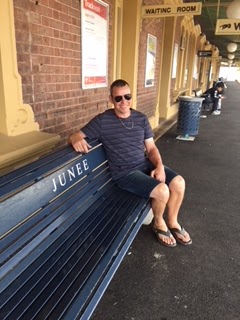We left Victoria mid-April and made our way slowly up through the country towns of the Riverina and the South-West Slopes, stopping along the way to enjoy what the towns had to offer and also one special stop in Narrandera, where I was able to catch up with a friend who I'd grown up with in Sydney.
 |
| Carcoar Dam - outside Blayney |
We also called in for a few days to visit some relatives in Sydney, propping up on Uncle Neville's 5-acre property in Dural. It was lovely to see them again, but we certainly did not miss the city and all its traffic and hustle-bustle.
On the road again on May 1, we travelled up through Bathurst and Orange, and stopped for a day to explore the historic town of Hill End. It's a fascinating town that has been almost entire brought under the protection of Parks and Wildlife and stands as a great example of early settlement life in the gold rush era.
 |
| Hill End store |
We moved on, heading slowly north-west, stopping at Mudgee and at Ponto Falls, and spent a great day in Nyngan, taking in the local show for a day.
 |
| Ponto Falls - outside Wellington |
 |
| Cattle judging at Nyngan Show |
From Nyngan we travelled through Cobar to Louth and stopped at the historic pub there (for research purposes only, I can assure you!!!)
After a weeks' slow dawdle up, we arrived at Trilby, ready for whatever was to come. It was a bit exciting, but also a bit sad to see how dry the country is up here.
Trilby Station is an enormous sheep station, covering 320,000 acres with the Darling River forming part of its boundary. Gary and Liz Murray own Trilby and have lived here, raising their 4 children since 1981. Gary is part of the Murray family who have been farming this area since the 1860's. His kids are the 6th generation of Darling River farming Murrays. Trilby was once part of the mighty Dunlop Station, a million acres in the 1880's.
 |
| Trilby from the air - note how far the floodplains extend |
 |
| Dunlop Station homestead |
 |
They've been hand feeding now for the past 6 months and they find it hard to remember what they did to fill in their days prior to the hand feeding routine of 2 days feeding, 1 day doing whatever else has buggered up in the meantime. Hand feeding doesn't sound too bad, until you take into account the huge distances this property encompasses. We took a drive one day to the far end of the property to deliver some equipment, and we drove about 70km to get there, never leaving Murray land.
When the lads feed sheep, it involves moving the feed about over these distances, checking feeders haven't been emptied by feral goats or roos, checking water points and so on. They leave before daylight and get back after dark.
Although the feral goats are a nuisance, they are also a very important income factor for the Murrays, and most sheep farmers around here, being the most widely exported meat out of Australia. And there's plenty of them out this way! A female goat begins breeding at about 7 months, has 2 kiddings a year and often bears 2, 3 or 4 kids at a time! They graze on scrub rather than grasses, so are ideal for this scrubby country. Being feral, they wander, going straight through fences, and are only considered yours to muster when they are on your property - if they go next door, they're no longer yours.
We have been really lucky to be working at Trilby during their busiest, and most exciting time of the year - shearing. This began the week we arrived, and finishes this week.
Due to the size of the station, they have 5 shearing sheds, and the sheep in the vicinity of each shed are mustered and shorn there. The shearing contractors moved into the quarters out at the far end of the property for a couple of weeks and travelled to the outer sheds, but have moved down to the shearers bunkhouse at the main farm now for the final week. The Murrays contract a shearing team, which consists of 6 shearers and about the same in roustabouts and wool classers. They have a cook who travels with them and makes enormous amounts of food for them each day and tries to keep them all in line.
 |
| Waiting their turn at New Chum woolshed |
 |
| Shearers at New Chum |
 |
| Mick doing his thing |
It's expected that, at the end of the shearing, they'll have around 450 bales of wool. A bale weighs around 186kg, containing the wool from 32 grown sheep. Wool prices are currently high, with 80% of Australian wool being exported to China, so that helps while the current drought makes it hard in other ways.
Trilby is a really well equipped station, with vehicles for every purpose. There's the usual Toyota utes, bikes, quads, tractors, an excavator, a tipper truck, a prime mover, a low-loaders and my personal favourite, the 4WD buggy - I've had great fun running around on that. Doug gets to play on tractors and with forklifts and we both enjoy a late afternoon drive around the river loop, checking on the campers - making sure they're settled and have everything they need.
Trilby also has two planes on the property - Gary has his workhorse Cessna and the oldest son, Tom, also has a plane for commuting when he needs to. Gary uses his for mustering and checking stock - considering the huge distances that can be travelled it makes things a lot easier.
The planes also come into their own when the property is under flood. During a flood the homestead and immediate surrounds become an island, isolated for months at a time, so with the planes, the Murrays are able to stay in their home and use the plane to fly to a higher airstrip on another part of the property where they can drive to "work" or to get supplies. The last flood at Trilby was 2012.
To diversify a bit, Trilby offers accommodation to tourists - everything from lovely self-contained cottages (old Overseers and Jillaroos cottages), lovely secluded riverside campsites, some powered sites and the Shearers Bunkhouse. The tourism side of the farm is busy and keeps Liz on her toes. To help, she has teams of volunteers who come to help for a period of time over the busy months of the year. That's where we come in. In exchange for our powered site and lots of lovely lamb from the freezer, we were to offer 2 hours a day of helping out.
While we've been here, our main duties were, for me to keep the bathrooms clean and help with making up rooms etc and for Doug, to empty the bins around the campsites and make sure everyone had firewood etc.
What's happened, in fact, is that we both were enjoying our time here so much, and didn't want to sit about doing nothing, so we were doing much more than our key tasks; helping out in lots of other ways and enjoying being part of station life. It's great to be able to help Liz out, as she is constantly on the go and hopefully we make things a bit easier for her. And Doug has been kept busy doing lots of tree work - tidying up the trees around the cottages, homestead and campsite. Because we had so much extra work to do, our time here has been extended from the original two weeks, to a month. This meant we were able to spend some time with our friends Leanne and Paul. They were the next volunteer couple and were supposed to back onto our time here. As we've stayed on for an extra two weeks, we've now overlapped.
 |
| Morning muster |
 |
| Shedding the sheep before shearing |
But for now, we're looking forward to the "cutting-out" party tonight, to celebrate the end of the shearing - it should be a big night!!!




No comments:
Post a Comment